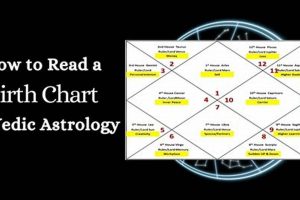This ancient Indian system analyzes planetary positions at birth to offer insights into an individual’s professional aptitudes, potential career paths, and likely periods of success. For example, the placement of Saturn might indicate a predisposition towards disciplines requiring perseverance and structure, while a prominent Jupiter could suggest roles involving leadership or teaching.
Understanding these planetary influences can provide valuable guidance in navigating career choices, recognizing opportune moments for advancement, and mitigating potential challenges. This practice is rooted in the belief that aligning one’s professional life with inherent cosmic energies can lead to greater fulfillment and accomplishment. Historically, astrological guidance has played a significant role in various cultures, including India, in making important life decisions, including career choices.
Further exploration of this topic will delve into the specific planetary influences, astrological houses related to profession, and the techniques employed by practitioners to offer career-related guidance. This includes examining the roles of the Sun, Moon, and other planets in shaping professional inclinations.
These suggestions offer practical ways to integrate astrological wisdom into career decisions.
Tip 1: Identify Key Planetary Influences: Consulting an experienced practitioner can reveal the planets most influential in one’s birth chart concerning career prospects. This understanding can illuminate inherent strengths and potential challenges.
Tip 2: Understand the Significance of Astrological Houses: The tenth house traditionally represents career and public image. Analyzing this house provides insights into suitable professions and the potential for recognition.
Tip 3: Recognize Favorable Periods: Planetary transits can create periods more conducive to career growth. Awareness of these cycles allows for strategic planning and maximizing opportunities.
Tip 4: Address Potential Challenges: Astrology can highlight potential obstacles. Understanding these challenges beforehand allows for proactive mitigation strategies and informed decision-making.
Tip 5: Integrate Self-Reflection: While astrology provides valuable insights, introspection and self-awareness remain crucial for making authentic career choices aligned with personal values.
Tip 6: Seek Professional Guidance: Consulting with a qualified practitioner offers personalized interpretations and guidance tailored to one’s unique astrological profile.
By understanding and applying these principles, individuals can gain valuable insights into their professional potential and navigate their careers with greater clarity and purpose.
This knowledge empowers individuals to align their professional pursuits with their inherent strengths and cosmic influences, leading to greater fulfillment and success.
1. Planetary Placements
Planetary placements form the foundation of Vedic astrological career analysis. Each planet embodies specific energies and influences, impacting professional inclinations and potential career paths. The position of these planets at the time of birth within the twelve astrological houses creates a unique blueprint for an individual’s professional life. This intricate interplay reveals inherent strengths, potential challenges, and suitable career directions. For instance, a well-placed Mercury might suggest aptitude for communication and intellectual pursuits, indicating potential success in fields like writing, teaching, or commerce. Conversely, a debilitated Mars could indicate difficulties with assertiveness, requiring focused efforts in developing leadership skills.
Analyzing planetary placements offers practical guidance for navigating career choices. Understanding the influence of a strong Jupiter in the second house, which governs finances, might encourage exploration of fields like banking or investment. Similarly, recognizing the impact of Saturn in the sixth house, related to service, could guide individuals towards healthcare or social work. Furthermore, the placement of the Sun, representing one’s core identity, provides valuable insights into areas where one can shine and achieve recognition. A prominent Sun in the fifth house, connected to creativity and self-expression, might suggest a career in the arts or entertainment.
In summary, planetary placements provide a detailed roadmap for navigating the professional landscape. This understanding allows individuals to align their career aspirations with inherent strengths, mitigate potential weaknesses, and make informed decisions that contribute to a fulfilling and successful professional life. While planetary influences offer valuable insights, individual actions and choices remain crucial factors in shaping career outcomes. This analysis serves as a powerful tool for self-discovery and informed decision-making, empowering individuals to take proactive steps towards realizing their professional potential.
2. Astrological Houses
Vedic astrology utilizes twelve astrological houses, each representing specific areas of life, to provide a comprehensive understanding of an individual’s karmic predispositions. These houses offer crucial insights into career aptitude and professional trajectory when analyzed within the context of career Vedic astrology. Each house signifies distinct attributes and influences, impacting career choices and professional experiences.
- First House (Ascendant):
The First House represents the self, personality, and overall approach to life. This house influences how one presents themselves in the professional world and the types of careers they are drawn to. A strong first house often indicates leadership qualities and a proactive approach to career development. For example, a prominent Mars in the first house might suggest a career in a competitive field like sports or business.
- Tenth House (Midheaven):
The Tenth House governs career, public image, reputation, and achievements. This house is paramount in career Vedic astrology, offering insights into suitable professions, potential for recognition, and overall career trajectory. Benefic planets in the tenth house generally indicate a successful and fulfilling career. For example, a well-placed Jupiter in the tenth house could indicate a career in law, education, or a position of authority.
- Second House:
The Second House represents finances, resources, and material possessions. While not directly related to career choice, this house indicates financial stability and potential for wealth accumulation through one’s profession. A strong second house suggests financial security and the ability to create wealth through chosen career paths. For example, a well-aspected Venus in the second house might indicate a career in finance, luxury goods, or the arts.
- Sixth House:
The Sixth House governs daily work, service, health, and competition. This house offers insights into the work environment, colleagues, and potential challenges in one’s career. Analyzing the sixth house can reveal information about job satisfaction and work-life balance. A strong Saturn in the sixth house, while potentially challenging, could signify a career in healthcare, social work, or disciplined fields requiring attention to detail.
Analyzing these key houses, along with other relevant planetary placements and astrological combinations, provides a comprehensive understanding of an individual’s career potential within the framework of Vedic astrology. These insights empower individuals to make informed career choices, navigate professional challenges effectively, and align their actions with their inherent strengths and karmic predispositions for greater success and fulfillment. The interplay between these houses creates a nuanced picture of one’s professional life, offering valuable guidance for navigating the complexities of the career landscape.
3. Dasha Periods
Dasha periods represent planetary cycles that exert significant influence over various life aspects, including career trajectory, within the framework of Vedic astrology. These periods, calculated based on the position of the Moon at birth, signify specific planetary influences that dominate particular timeframes in an individual’s life. Understanding the nature and duration of these planetary periods provides valuable insights into opportune moments for career growth, potential challenges, and overall professional development. Each planetary Dasha period carries unique characteristics and implications for career progression. For instance, a Jupiter Dasha often signifies a period of growth, expansion, and opportunities for advancement, while a Saturn Dasha may present challenges and require perseverance and hard work. The interplay of these planetary cycles with individual actions and choices shapes the overall career path. Consider an individual experiencing a Venus Dasha, associated with creativity and social harmony. This period could present opportunities for careers in the arts, public relations, or fields requiring strong interpersonal skills. Conversely, a Mars Dasha, associated with energy and drive, might favor professions requiring assertiveness and leadership, such as entrepreneurship or roles in competitive industries.
Practical application of Dasha period analysis involves understanding the specific planetary influences during particular phases of one’s career. Recognizing a favorable period, such as a well-aspected Mercury Dasha, allows for strategic career moves, such as pursuing higher education, starting a new venture, or seeking promotions. Conversely, awareness of potentially challenging periods, such as a Ketu Dasha associated with introspection and uncertainty, can assist in navigating difficulties and mitigating risks. For example, during a challenging Dasha, focusing on skill development, networking, or seeking mentorship can provide support and prepare for future opportunities. Analyzing Dasha periods in conjunction with other astrological factors, such as planetary placements and transits, provides a comprehensive view of career prospects and enables proactive career management.
In summary, understanding Dasha periods within the context of career Vedic astrology offers a valuable tool for navigating the complexities of professional life. This knowledge empowers individuals to anticipate opportunities, prepare for challenges, and align their actions with favorable planetary influences. Integrating this understanding with self-awareness and proactive career planning enhances the likelihood of achieving professional goals and creating a fulfilling career path. While Dasha periods offer valuable insights, they do not dictate destiny. Individual choices and actions remain crucial in shaping career outcomes.
4. Nakshatras
Nakshatras, the 27 lunar mansions in Vedic astrology, offer nuanced insights into personality, temperament, and inherent skills, thus playing a crucial role in career Vedic astrology. Each Nakshatra possesses unique qualities influencing an individual’s strengths, weaknesses, and preferred modes of operation. This understanding provides valuable guidance in identifying suitable career paths aligned with one’s natural inclinations and potential for success. For example, individuals born under the Nakshatra of Rohini, known for creativity and artistic expression, may find fulfillment in careers related to art, design, or entertainment. Conversely, those born under the Nakshatra of Uttara Phalguni, associated with leadership and organization, might excel in managerial roles or entrepreneurial ventures.
The practical application of Nakshatra analysis involves understanding the specific qualities associated with each lunar mansion and their influence on career choices. Consider the Nakshatra of Hasta, known for dexterity and skill in craftsmanship. Individuals born under this Nakshatra may find success in careers involving intricate work, such as surgery, engineering, or crafting. Similarly, the Nakshatra of Shatabhisha, associated with healing and research, might guide individuals towards careers in medicine, science, or investigative fields. By understanding these connections, individuals can make informed decisions about educational pursuits, career paths, and professional development. This knowledge empowers individuals to leverage their inherent strengths and navigate potential career challenges effectively.
In summary, Nakshatra analysis provides a deeper layer of understanding within career Vedic astrology. It reveals specific talents, behavioral tendencies, and preferred work styles, allowing for more precise career guidance. This detailed perspective facilitates alignment between individual capabilities and suitable professional pursuits, ultimately contributing to greater career satisfaction and success. While Nakshatras offer valuable insights, they should be considered in conjunction with other astrological factors for a comprehensive understanding. Integrating this knowledge with self-awareness and proactive career planning enhances the likelihood of finding a fulfilling and rewarding professional path.
5. Remedial Measures
Remedial measures in career Vedic astrology address planetary afflictions or unfavorable astrological combinations impacting professional life. These measures aim to mitigate potential challenges, enhance positive influences, and improve career prospects. This approach recognizes that while planetary placements influence predispositions, actions can modify outcomes. For instance, a weakened Mercury, associated with communication and intellect, might hinder professional progress. Remedial measures, such as chanting specific mantras dedicated to Mercury or wearing gemstones associated with the planet, aim to strengthen its influence, potentially improving communication skills and decision-making abilities, crucial for career advancement. Similarly, specific rituals or charitable acts associated with a particular planet may be recommended to alleviate its negative impact. A practical example could involve an individual facing obstacles in career growth due to a debilitated Saturn. Remedial measures, like donating to charities supporting the elderly or engaging in activities promoting discipline and perseverance, could mitigate Saturn’s negative influence and potentially improve career prospects.
These measures do not guarantee specific outcomes but serve as supportive tools to navigate potential challenges and enhance favorable planetary influences. The effectiveness of these measures depends on various factors, including the individual’s birth chart, the specific planetary afflictions, and the sincerity with which the remedies are performed. One’s efforts in skill development, networking, and professional development remain crucial alongside astrological remedies. For example, while gemstones might offer subtle support, actively pursuing professional development opportunities remains essential for career growth. Similarly, while mantras can enhance mental clarity, consistent effort in improving communication skills remains paramount for professional success. Remedial measures function as supportive elements within a broader framework of career development, encouraging proactive engagement with one’s professional journey.
In summary, remedial measures in career Vedic astrology provide a framework for addressing potential challenges and enhancing positive influences impacting professional life. They serve as supportive tools alongside practical efforts, empowering individuals to navigate their careers with greater awareness and effectiveness. These measures encourage proactive engagement with one’s professional path, emphasizing the importance of both astrological guidance and individual action in achieving career goals. Understanding the limitations and potential benefits of these measures allows for a balanced and informed approach to career development within the context of Vedic astrology.
6. Yogas (Auspicious Combinations)
Yogas, specific planetary combinations within a birth chart, hold significant importance in career Vedic astrology. These auspicious alignments indicate potential for success, leadership, and specific career aptitudes. Understanding these Yogas provides valuable insights into inherent strengths and potential career paths. Certain Yogas suggest specific professional inclinations. For example, a Raja Yoga, formed by the conjunction of a Kendra lord (lord of the 1st, 4th, 7th, or 10th house) and a Trikona lord (lord of the 1st, 5th, or 9th house), often signifies leadership potential, success in administration, or positions of authority. Similarly, a Saraswati Yoga, involving specific combinations of Jupiter, Mercury, and Venus, indicates intellectual prowess, artistic talent, and potential success in fields like writing, teaching, or communication. The presence of such Yogas doesn’t guarantee success but indicates a predisposition towards specific skills and professional domains. One’s efforts, choices, and external circumstances also contribute significantly to career outcomes.
Analysis of Yogas provides a framework for understanding potential career directions and maximizing inherent strengths. A Dharma-Karmadhipati Yoga, formed by a connection between the lords of the 9th and 10th houses, suggests alignment between one’s purpose (Dharma) and career (Karma), potentially leading to a fulfilling and successful professional life. Consider an individual with a strong Raja Yoga combined with planetary placements favoring technical skills. This combination might suggest a career in engineering management or leadership roles within technology-driven industries. Conversely, a Saraswati Yoga combined with a prominent Venus might indicate a successful career in the arts, particularly music, writing, or design. Understanding these Yogas allows individuals to align career choices with inherent strengths, potentially leading to greater professional fulfillment and achievement.
In summary, Yogas represent significant astrological combinations impacting career potential in Vedic astrology. Analyzing these Yogas, in conjunction with other astrological factors, provides valuable insights into inherent strengths, suitable career paths, and potential for professional success. While these Yogas offer valuable guidance, individual actions, choices, and external factors play a crucial role in shaping actual career outcomes. Yogas serve as indicators of potential, providing a roadmap for individuals to navigate their professional lives with greater awareness and purpose. This understanding empowers individuals to leverage inherent strengths, make informed career decisions, and strive towards a fulfilling and successful professional journey. The analysis of Yogas provides a valuable tool within career Vedic astrology, offering a nuanced understanding of individual potential and professional possibilities.
Frequently Asked Questions about Career Vedic Astrology
This section addresses common inquiries regarding the application of Vedic astrology to career guidance.
Question 1: How does Vedic astrology determine suitable career paths?
Vedic astrology analyzes planetary placements, astrological houses, and specific planetary combinations (Yogas) within an individual’s birth chart to identify inherent strengths, aptitudes, and potential career directions. The tenth house, governing career and public image, plays a crucial role in this analysis.
Question 2: Can Vedic astrology predict career success?
Vedic astrology does not predict career success with certainty. It offers insights into potential career paths, strengths, and challenges, providing a framework for informed decision-making. Actual success depends on individual actions, efforts, and external factors.
Question 3: How are Dasha periods relevant to career planning?
Dasha periods represent planetary cycles influencing different life phases. Understanding these cycles allows for strategic career planning, recognizing opportune moments for growth, and anticipating potential challenges. This knowledge assists in making informed decisions about career changes, promotions, or new ventures.
Question 4: What role do Nakshatras play in career guidance?
Nakshatras, lunar mansions in Vedic astrology, offer detailed insights into personality traits, skills, and behavioral patterns. This nuanced understanding helps identify career paths aligned with individual temperament and inherent strengths, potentially leading to greater job satisfaction and professional fulfillment.
Question 5: Can remedial measures in Vedic astrology guarantee career success?
Remedial measures, such as gemstone recommendations or mantra chanting, aim to mitigate negative planetary influences and enhance positive ones. While they can offer support, they do not guarantee career success. Individual efforts, skills, and external factors remain crucial determinants of professional outcomes.
Question 6: How can one find a qualified Vedic astrologer for career guidance?
Seeking recommendations from trusted sources, researching astrologers’ credentials and experience, and scheduling consultations to discuss specific career-related questions can help individuals find a qualified and reputable Vedic astrologer for personalized guidance. Thorough research and clear communication of needs are essential in this process.
Understanding these fundamental aspects of career Vedic astrology provides a foundation for informed decision-making and proactive career management. While astrology offers valuable insights, individual actions and choices ultimately shape one’s professional journey.
This concludes the FAQ section. Further exploration may involve personalized consultations with qualified Vedic astrologers for specific career guidance tailored to individual birth charts.
Career Vedic Astrology
This exploration has examined the multifaceted system of career Vedic astrology, encompassing planetary placements, astrological houses, Dasha periods, Nakshatras, remedial measures, and auspicious Yogas. Each element contributes to a comprehensive understanding of individual potential and professional trajectory within this ancient framework. The analysis underscores the significance of aligning career choices with inherent strengths, navigating potential challenges through informed decision-making, and leveraging opportune periods for growth. This system offers a structured approach to understanding professional predispositions and maximizing opportunities for a fulfilling career.
Ultimately, career Vedic astrology provides a valuable tool for self-discovery and informed career navigation. While it offers insightful guidance, individual actions, continuous learning, and adaptability remain crucial for achieving professional goals. Integrating this ancient wisdom with contemporary career development strategies empowers individuals to navigate the complexities of the professional landscape with greater awareness and purpose, striving towards a fulfilling and successful career journey.







